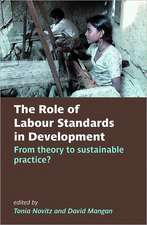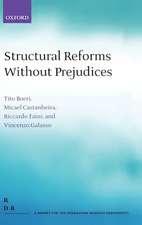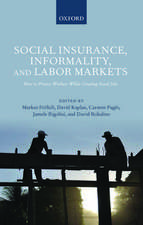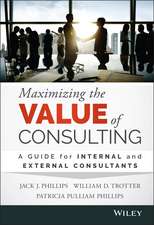The Allure of Labor – Workers, Race, and the Making of the Peruvian State
Autor Paulo Drinoten Limba Engleză Paperback – 24 apr 2011
Preț: 264.64 lei
Nou
Puncte Express: 397
Preț estimativ în valută:
50.64€ • 52.57$ • 42.23£
50.64€ • 52.57$ • 42.23£
Carte tipărită la comandă
Livrare economică 22 martie-05 aprilie
Preluare comenzi: 021 569.72.76
Specificații
ISBN-13: 9780822350132
ISBN-10: 0822350130
Pagini: 328
Ilustrații: 13 illustrations
Dimensiuni: 155 x 233 x 20 mm
Greutate: 0.46 kg
Editura: MD – Duke University Press
ISBN-10: 0822350130
Pagini: 328
Ilustrații: 13 illustrations
Dimensiuni: 155 x 233 x 20 mm
Greutate: 0.46 kg
Editura: MD – Duke University Press
Cuprins
Acknowledgments ix
Introduction 1
1. Racializing Labor 17
2. Constituting Labor 51
3. Disciplining Labor 85
4. Domesticating Labor 123
5. Feeding Labor 161
6. Healing Labor 193
Conclusion 231
Notes 239
Bibliography 281
Index 305
Introduction 1
1. Racializing Labor 17
2. Constituting Labor 51
3. Disciplining Labor 85
4. Domesticating Labor 123
5. Feeding Labor 161
6. Healing Labor 193
Conclusion 231
Notes 239
Bibliography 281
Index 305
Recenzii
"In The Allure of Labor, Paulo Drinot elegantly explores how the Peruvian state sought to define, teach, improve, guard and control labour during the early twentieth century.... Drinots book provides a fascinating investigation into how the Peruvian state strived to fashion labour into an agent of progress. His contribution to racial and ethnic studies comes from his examination of the racial construction of labour and the racial logic behind Perus labour policies.... The Allure of Labor opens up space for fruitful discussions, providing a wealth of historical data on Peru that can enrich existing debates on the racialization of food, space, health and labour. - Karem Roitman, Ethnic and Racial Studies, February 2012
In this important book, Paulo Drinot explains perfectly the paradox of Perus early-twentieth-century labor legislation: On the one hand, it was comparatively quite progressive given the countrys level of industrialization; on the other hand, it was entirely inadequate in dealing with the labor conditions experienced by most of the countrys workers. . . . I have long looked for a book that clearly highlights the hopes and fears that modernity inspired among Perus elites, and the way that their ambivalence was racialized. The Allure of Labor does the trick.--David S. Parker, author of The Idea of the Middle Class: White-Collar Workers and Peruvian Society, 19001950
The Allure of Labor is an outstanding book, and its contribution to debates about race, identity, and state formation extend its relevance far beyond Peru.--Charles Walker, author of Shaky Colonialism: The 1746 Earthquake-Tsunami in Lima, Peru, and Its Long Aftermath
"In The Allure of Labor, Paulo Drinot elegantly explores how the Peruvian state sought to define, teach, improve, guard and control labour during the early twentieth century... Drinot's book provides a fascinating investigation into how the Peruvian state strived to fashion labour into an agent of progress. His contribution to racial and ethnic studies comes from his examination of the racial construction of labour and the racial logic behind Peru's labour policies... The Allure of Labor opens up space for fruitful discussions, providing a wealth of historical data on Peru that can enrich existing debates on the racialization of food, space, health and labour." - Karem Roitman, Ethnic and Racial Studies, February 2012 "In this important book, Paulo Drinot explains perfectly the paradox of Peru's early-twentieth-century labor legislation: On the one hand, it was comparatively quite progressive given the country's level of industrialization; on the other hand, it was entirely inadequate in dealing with the labor conditions experienced by most of the country's workers... I have long looked for a book that clearly highlights the hopes and fears that 'modernity' inspired among Peru's elites, and the way that their ambivalence was racialized. The Allure of Labor does the trick."--David S. Parker, author of The Idea of the Middle Class: White-Collar Workers and Peruvian Society, 1900-1950 "The Allure of Labor is an outstanding book, and its contribution to debates about race, identity, and state formation extend its relevance far beyond Peru."--Charles Walker, author of Shaky Colonialism: The 1746 Earthquake-Tsunami in Lima, Peru, and Its Long Aftermath
In this important book, Paulo Drinot explains perfectly the paradox of Perus early-twentieth-century labor legislation: On the one hand, it was comparatively quite progressive given the countrys level of industrialization; on the other hand, it was entirely inadequate in dealing with the labor conditions experienced by most of the countrys workers. . . . I have long looked for a book that clearly highlights the hopes and fears that modernity inspired among Perus elites, and the way that their ambivalence was racialized. The Allure of Labor does the trick.--David S. Parker, author of The Idea of the Middle Class: White-Collar Workers and Peruvian Society, 19001950
The Allure of Labor is an outstanding book, and its contribution to debates about race, identity, and state formation extend its relevance far beyond Peru.--Charles Walker, author of Shaky Colonialism: The 1746 Earthquake-Tsunami in Lima, Peru, and Its Long Aftermath
"In The Allure of Labor, Paulo Drinot elegantly explores how the Peruvian state sought to define, teach, improve, guard and control labour during the early twentieth century... Drinot's book provides a fascinating investigation into how the Peruvian state strived to fashion labour into an agent of progress. His contribution to racial and ethnic studies comes from his examination of the racial construction of labour and the racial logic behind Peru's labour policies... The Allure of Labor opens up space for fruitful discussions, providing a wealth of historical data on Peru that can enrich existing debates on the racialization of food, space, health and labour." - Karem Roitman, Ethnic and Racial Studies, February 2012 "In this important book, Paulo Drinot explains perfectly the paradox of Peru's early-twentieth-century labor legislation: On the one hand, it was comparatively quite progressive given the country's level of industrialization; on the other hand, it was entirely inadequate in dealing with the labor conditions experienced by most of the country's workers... I have long looked for a book that clearly highlights the hopes and fears that 'modernity' inspired among Peru's elites, and the way that their ambivalence was racialized. The Allure of Labor does the trick."--David S. Parker, author of The Idea of the Middle Class: White-Collar Workers and Peruvian Society, 1900-1950 "The Allure of Labor is an outstanding book, and its contribution to debates about race, identity, and state formation extend its relevance far beyond Peru."--Charles Walker, author of Shaky Colonialism: The 1746 Earthquake-Tsunami in Lima, Peru, and Its Long Aftermath
Notă biografică
Descriere
How intellectuals and policymakers in early 20th century Peru came to believe that industrialization and a modern workforce would transform Peru into a civilized nation
















